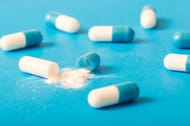Probiotics are gut-friendly bacteria present in the intestine. Friendly microbes also live on our skin.
Gut microbes increase the absorption of nutrients, improve bowel movement, and protect the gut. Probiotic-rich foods can promote digestive health. Astonishingly, the number of bacteria in our body is almost equal to the number of body cells.

These microbes are a combination of:
- Bacteria.
- Fungi (including yeasts).
- Viruses.
- Protozoa.
The first probiotic was discovered in Bulgarian yogurt. It's a type of bacillus bacteria known as Lactobacillus bulgaricus. Probiotics can also improve mental health and the growth of probiotic bacteria.
The Alliance for Education on Probiotics aims to educate people on probiotic bacteria and their health benefits.
Dr. John Damianos, M.D., a resident physician at Yale New Haven Hospital, recommends the use of probiotic supplements in Helicobacter pylori infections. That can be helpful in treating stomach ulcers.
What Are The Benefits of Probiotics?

These microorganisms can offer various health benefits when consumed regularly. The benefits and what do probiotics do are listed below:
Inflammation: Probiotic supplements can reduce inflammation in the body and prevent chronic inflammatory conditions. A review article published in the journal Functional Foods in Health and Disease found that the microbiome can regulate and reduce inflammation in the body.
Weight loss: A study published in the journal Nutrition Today found that obese individuals have a different gut microbiome composition than people with normal BMI.
Another study published in the popular journal Nutrients concluded that the gut microbiome can influence metabolism and play a key role in weight loss and body composition.
Depression and anxiety: Lactobacillus helveticus and Bifidobacterium longum can reduce anxiety and depression in people.
Research published in the journal Current Opinion in Biotechnology studied probiotic microbes, and their interactions and implications for anxiety and depression. It's also known as the gut-brain axis.
Cholesterol: Probiotic supplements have been shown to lower total and LDL cholesterol levels in research. A research article published in the journal Medicine elaborated on the effects of probiotic microbes on total cholesterol in the blood.
Blood pressure: Probiotic supplements may also have a beneficial effect in reducing blood pressure.
Research conducted by the Griffith Health Institute and the School of Medicine at Griffith University, Australia, in the journal Hypertension, analyzed several data associating probiotic bacteria with decreased blood pressure.
Immune function: Certain strains of bacteria are known to enhance immune function, which can reduce the frequency of common infections. Research published in the British Journal of Nutrition has indicated that probiotic microbes might reduce the duration of illness in respiratory infections.
Skin health: Probiotic supplements were found to be useful for acne, rosacea, and types of eczema, as well as other skin disorders.
Research conducted by the Department of Applied Sciences, Northumbria University, Newcastle, has indicated positive results with regard to various skin conditions, including acne and photo aging.
Anti-aging: These bacteria might increase the longevity of cells by protecting them from damage. However, further research is needed to affirm that.
Are There Any Side Effects of Probiotics?

Probiotics are generally considered safe for most individuals. Most probiotic supplements are regulated by the Food and Drug Administration (FDA).
Many products also declare third-party certifications with regard to quality and safety. Many nutraceutical brands often make products without emphasizing the quality and claim health benefits that are not supported by evidence-based research. People should be aware of such products while purchasing probiotic supplements.
How and When To Take Probiotics?
Naturally prepared probiotic-rich foods can be consumed at any time. Probiotic supplements, including capsules and powders, should be taken with plain water in an empty stomach. The water should not be warm or hot. Hot and cold beverages must be avoided before or after taking probiotic supplements.
Probiotics can be extremely beneficial to health. These are friendly microbes that can be found in probiotic-rich foods and supplements.
It's advisable to look for safe and certified products while buying probiotic supplements. Many products contain added herbs, so it's wise to look for any potential allergens present in these capsules. Probiotic supplements must be stored in a cool and dry place.
